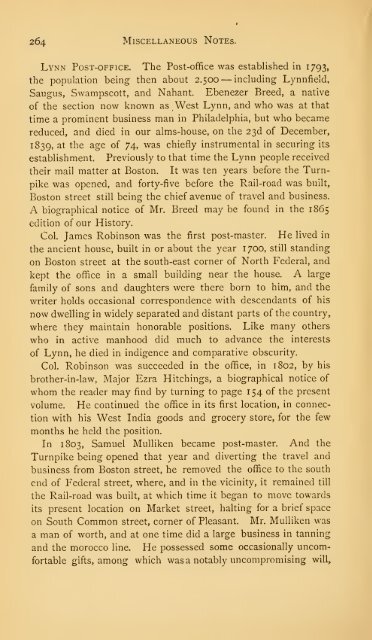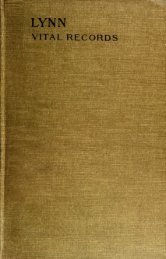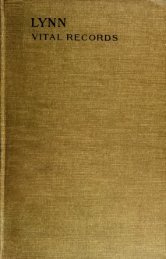- Page 2:
fo LIBRARY OF THE DATE DUE .f^i
- Page 8:
ST. MARGARET S CHURCH, KINGS LV.W,
- Page 12 and 13:
Ay o
- Page 14 and 15:
^1 ^ NOTE. , o The volume of tlie H
- Page 17 and 18:
PREFACE. It may properly be remarke
- Page 19 and 20:
: CONTENTS I. Introduction : beginn
- Page 21 and 22:
: : ILLUSTRATIONS. Preceding the ti
- Page 23 and 24:
: HISTORY OF LYNN. INTRODUCTION. It
- Page 25 and 26:
Introduction. ii ba3\ Vineyard soun
- Page 27 and 28:
Introduction, 13 In the writer's ow
- Page 29 and 30:
Introduction. 15 town a legacy, in
- Page 31 and 32:
ANNALS. [Note. These Annals are con
- Page 33 and 34:
ANNALS OF LYNN 1865, I9 Independenc
- Page 35 and 36:
ANNALS OF LYNN — 1 866. 21 Very d
- Page 37 and 38:
ANNALS OF LYNN 1 86/. 2$ On Sunday,
- Page 39 and 40:
ANNALS OF LYNN 1 86/. 25 A little b
- Page 41 and 42:
ANNALS OF LYNN 1 868. 2/ other thin
- Page 43 and 44:
ANNALS OF LYNN I 868. 29 vering lab
- Page 45 and 46:
ANNALS OF LYNN 1 869. 3 I Saugus ra
- Page 47 and 48:
ANNALS OF LYNN 1 869. 33 privilege
- Page 49 and 50:
ANNALS OF LYNN — 187O. 35 Streets
- Page 51 and 52:
ANNALS OF LYNN 187O. 37 The Exchang
- Page 53 and 54:
ANNALS OF LYNN — 187O. 39 The num
- Page 55 and 56:
ANNALS OF LYNN 187O. 4I It may, per
- Page 57 and 58:
ANNALS OF LYNN 1 8/ 1. 43 health, a
- Page 59 and 60:
ANNALS OF LYNN 1 8/ 1. 45 some seve
- Page 61 and 62:
ANNALS OF LYNN I 8/ 1. 47 within a
- Page 63 and 64:
ANNALS OF LYNN 1 872. 49 1872. The
- Page 65 and 66:
ANNALS OF LYNN 1 872. 5 I generally
- Page 67 and 68:
ANNALS OF LYNN I872. 53 hot-heads,
- Page 69 and 70:
ANNALS OF LYNN 1872. 55 Odd Fellows
- Page 71 and 72:
• ANNALS OF LYNN 1873- 57 18 7 3.
- Page 73 and 74:
ANNALS OF LYNN 1 8/3. 59 tary. His
- Page 75 and 76:
ANNALS OF LYNN 1 874. 6l pletely wr
- Page 77 and 78:
ANNALS OF LYNN 1 874. 63 sitting po
- Page 79 and 80:
every part of the country. ANNALS O
- Page 81 and 82:
ANNALS OF LYNN 1 8/5. ^'J 1875 . De
- Page 83 and 84:
ANNALS OF LYNN 1 8/6. 69 invited co
- Page 85 and 86:
ANNALS OF LYNxM 1876. 7I " Let US p
- Page 87 and 88:
ANNALS OF LYNN 1 877. 73 resident.
- Page 89 and 90:
ANNALS OF LYNN 1 877. 75 million of
- Page 91 and 92:
ANNALS OF LYNN 1 878. yj the same t
- Page 93 and 94:
ANNALS OF LYNN I 879. 79 the mutila
- Page 95 and 96:
1 ANNALS OF LYNN 1 879. 8 the court
- Page 97 and 98:
ANNALS OF LYNN — 1 879. 83 charac
- Page 99 and 100:
ANNALS OF LYNN 1880. 85 June 29. De
- Page 101 and 102:
ANNALS OF LYNN 1880. Sy The entire
- Page 103 and 104:
ANNALS OF LYNN 1881. 89 where he bo
- Page 105 and 106:
ANNALS OF LYNN — I 88 I. 9I entir
- Page 107:
j Interior of St. Stephen's Church.
- Page 110 and 111:
94 ANNALS OF LYNN 1881. to run in t
- Page 112 and 113:
96 ANNALS OF LYNN I 88 1. and the a
- Page 114 and 115:
98 Biographical Sketches. Introdu£
- Page 116 and 117:
loo Biographical Sketches, Adams. A
- Page 118 and 119:
102 BiOGR.\PHicAL SKETCHES. Avmitag
- Page 120 and 121:
104 Biographical Sketches. Armitage
- Page 122 and 123:
io6 Biographical Sketches. Armitage
- Page 124 and 125:
io8 Biographical Sketches. Attwill.
- Page 126 and 127:
;: I lo Biographical Sketches. Bach
- Page 128 and 129:
112 Biographical Sketches. Batcheld
- Page 130 and 131:
: 114 Biographical Sketches. Blanch
- Page 132 and 133:
ii6 Biographical Sketches. Bowler.
- Page 134 and 135:
^ ii8 Biographical Sketches. Breed.
- Page 136 and 137:
; I20 Biographical Sketches. Breed.
- Page 138 and 139:
; 122 Biographical Sketches. Bridge
- Page 140 and 141:
; 124 Biographical Sketches. Brimbl
- Page 143 and 144:
; Biographical Sketches. Biiffiim.
- Page 145 and 146:
Biographical Sketches. Chadwell. 12
- Page 147 and 148:
Biographical Sketches. Checver. Chi
- Page 149 and 150:
Biographical Sketches. Cobbet. Coff
- Page 151 and 152:
Biographical Sketches. Doak. Doolit
- Page 153 and 154:
Biographical Sketches. Forman. Full
- Page 155 and 156:
Biographical Sketches. Gould. Gray.
- Page 157 and 158:
Biographical Sketches. Gray. 139 re
- Page 159 and 160:
: ; ; ; ;; ; : Biographical Sketche
- Page 161 and 162:
Biographical Sketches. Hannibal. Ha
- Page 163 and 164:
Biographical Sketches. Hart. 145 wo
- Page 165 and 166:
Biographical Sketches. Hazeltine. 1
- Page 167 and 168:
Biographical Sketches. Hazeltine. i
- Page 169 and 170:
Biographical Sketches. Hazeltine. 1
- Page 171 and 172:
Biographical Sketches. Hazeltine. 1
- Page 173 and 174:
Biographical Sketches. HitcJdngs. 1
- Page 175 and 176:
Biographical Sketches. Hutchinsoii.
- Page 177 and 178:
Biographical Sketches, yohnson. 159
- Page 179:
a, ?^7I^5?^T^ o O > z O r 2
- Page 182 and 183:
1 62 Biographical Sketches. Keene.
- Page 184 and 185:
164 Biographical Sketches. Laughton
- Page 186 and 187:
1 66 Biographical Sketches. Lewis.
- Page 188 and 189:
: 1 68 Biographical Sketches. Longl
- Page 190 and 191:
I/O Biographical Sketches. Lummus.
- Page 192 and 193:
172 Biographical Sketches. Marble.
- Page 194 and 195:
; 174 Biographical Sketches. Moiilt
- Page 196 and 197:
176 Biographical Sketches. Mudge. H
- Page 198 and 199:
178 Biographical Sketches. Mudge. c
- Page 200 and 201:
i8o Biographical Sketches. Newhall.
- Page 202 and 203:
1 82 Biographical Sketches. Newhall
- Page 204 and 205:
184 Biographical Sketches. Newhall.
- Page 206 and 207:
1 86 Biographical Sketches. Newhall
- Page 208 and 209:
; 1 88 Biographical Sketches. Newha
- Page 210 and 211:
: 190 Biographical Sketches. NewJia
- Page 212 and 213:
192 Biographical Sketches. Newhall.
- Page 214 and 215:
194 Biographical Sketches. Nye. Oli
- Page 216 and 217:
196 Biographical Sketches. Patch. P
- Page 218 and 219:
198 Biographical Sketches. Pitcher.
- Page 220 and 221:
200 Biographical Sketches. Purchis.
- Page 222 and 223:
202 Biographical Sketches. Rhodes.
- Page 224 and 225:
204 Biographical Sketches. Richards
- Page 226 and 227:
2o6 Biographical Sketches. Sadler.
- Page 228 and 229:
2o8 Biographical Sketches. Silsbce.
- Page 230 and 231:
210 Biographical Sketches. Swett. d
- Page 232 and 233:
212 Biographical Sketches. Trevett.
- Page 234 and 235: 214 Biographical Sketches. Walden.
- Page 236 and 237: 2i6 Biographical Sketches. Washburn
- Page 238 and 239: 2i8 Biographical Sketches. Widger.
- Page 240 and 241: 220 Biographical Sketches. JJ^ooc/.
- Page 242 and 243: 222 Miscellaneous Notes. ized — w
- Page 244 and 245: 224 Miscellaneous Notes. York, in t
- Page 246 and 247: 226 Miscellaneous Notes. as true th
- Page 248 and 249: 228 Miscellaneous Notes. their bein
- Page 250 and 251: 230 Miscellaneous Notes. It need no
- Page 252 and 253: 232 Miscellaneous Notes. of persons
- Page 254 and 255: 234 Miscellaneous Notes. the type-s
- Page 256 and 257: 236 Miscellaneous Notes. public dan
- Page 258 and 259: ; 238 Miscellaneous Notes. died in
- Page 260 and 261: ; : 240 Miscellaneous Notes. rial o
- Page 262 and 263: 242 Miscellaneous Notes. Society of
- Page 264 and 265: 244 Miscellaneous Notes. was erecte
- Page 266 and 267: 246 Miscellaneous Notes. Historic T
- Page 268 and 269: 248 Miscellaneous Notes. country's
- Page 270 and 271: 250 MlSCELLAIsTEOUS NOTES. a part o
- Page 272 and 273: : 252 Miscellaneous Notes. ago, pro
- Page 274 and 275: surrounded 254 Miscellaneous Notes.
- Page 276 and 277: 256 Miscellaneous Notes. promote th
- Page 278 and 279: 258 Miscellaneous Notes. the renown
- Page 280 and 281: 26o Miscellaneous Notes. Church, on
- Page 282 and 283: 262 Miscellaneous Notes. saued ; to
- Page 286 and 287: Even ; 266 Miscellaneous Notes. of
- Page 288 and 289: 268 Miscellaneous Notes. in 1 88 1,
- Page 290 and 291: 270 Miscellaneous Notes. Lynn Hospi
- Page 292 and 293: 2/2 Miscellaneous Notes. centralize
- Page 294 and 295: 274 Miscellaneous Notes. City Clerk
- Page 296 and 297: 2/6 Chronological Table. 1666. A ye
- Page 298 and 299: 2/8 Chronological Table. 1849. Lynn
- Page 300 and 301: 28o Chronological Table. 1869. The
- Page 302 and 303: 282 Chronological Table. 1881. The
- Page 304 and 305: 284 Tables. The foregoing Chronolog
- Page 306 and 307: 286 Conclusion. "To the deliverer o
- Page 308 and 309: ; 288 Conclusion. The facilities fo
- Page 310 and 311: 290 Conclusion. that lighted up the
- Page 312 and 313: 292 Mayors. MAYORS OF LYNN. In the
- Page 314 and 315: 294 Mayors. 1866, 'Gj, and '6^, Rol
- Page 316 and 317: : 296 Index. AuTOGRA PUS: — (Cont
- Page 318 and 319: I 298 Index. Biographical Sketches
- Page 320 and 321: : 300 Index. Courtis, Abel G., 25.
- Page 322 and 323: ; 302 Index. H. Home, Children's, 2
- Page 324 and 325: 304 Index. Lynn : Hospital, 270. in
- Page 326 and 327: 3o6 Phillips, George W., 85, 197 ;
- Page 328 and 329: 3o8 Index. Storms, violent, 22, 23,
- Page 330 and 331: 310 Index. INDEX TO PICTORIAL ADDEN
- Page 332 and 333: 312 Pictorial Addenda. the patrioti
- Page 334 and 335:
314 Pictorial Addenda. This was the
- Page 336 and 337:
3i6 Pictorial Addenda. Next we pres
- Page 338 and 339:
3i8 Pictorial Addet^da. Allusions h
- Page 340 and 341:
320 Pictorial Addenda. Governor Gra
- Page 342:
322 Pictorial Addenda. of probably
- Page 350 and 351:
330 ANNALS OF LYNN 1882. Glen Lewis
- Page 352 and 353:
332 ANNALS OF LYNN 1884. The Lynn H
- Page 354 and 355:
334 ANNALS OK LYNX 1885. Liician Ne
- Page 356 and 357:
33^ ANNALS OF LYNN 1887. command of
- Page 358 and 359:
338 ANNALS OF LYNN 1888. timidity.
- Page 360 and 361:
340 ANNALS OF LYNN— St. Luke's (M
- Page 362 and 363:
342 ANNALS OF LYNN 1889. nations fr
- Page 364 and 365:
344 ANNALS OF LYNN 1889. American f
- Page 367 and 368:
ANNALS OF LYNN 1889. 345 The despat
- Page 369 and 370:
: ANNALS OF LYNN 189O. 347 The name
- Page 371 and 372:
ANNALS OF LYNN 189O. 349 violent cy
- Page 373 and 374:
ANNALS OF LYNN 189O. 35 I Rev. Samu
- Page 375 and 376:
; ANNALS OF LYNN 189O, 353 Also two
- Page 377 and 378:
ANNALS OF LYNN 189I. 355 from dista
- Page 379 and 380:
ANNALS OF LYNN 189I. 357 in which f
- Page 381 and 382:
ANNALS OF LYNN 1 89 1. 359 extensiv
- Page 383 and 384:
ANNALS OF LYNN 189I. 361 the pen, o
- Page 385 and 386:
ANNALS OF LYNN 1892. 363 or sulky h
- Page 387 and 388:
ANNALS OF LYNN 1 892. 365 sympathet
- Page 389 and 390:
: ANNALS OF LYNN 1892. 367 were occ
- Page 391 and 392:
ANNALS OF LYNN 1892. 369 for many 3
- Page 393 and 394:
ANNALS OF LYNN 1892. 37 I i8g2.'''
- Page 395 and 396:
HISTORY OF LYNN. 373 increasing dem
- Page 397:
Lynn Hospital. 1888. The above is a
- Page 400 and 401:
376 HISTORY OF LYNN. lodges in Lynn
- Page 402 and 403:
378 HISTORY OF LYNN. the last seven
- Page 404 and 405:
38o HISTORY OF LYNN, Biog. and Pers
- Page 406 and 407:
382 HISTORY OF LYNN. Lily pond, 347
- Page 409 and 410:
1629 1893 LYNN HER COMPLETE HISTORY









